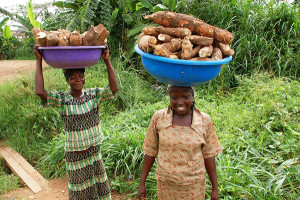
For nearly a billion people around the world, cassava is a staple crop and a primary source of calories. The plant is easy to cultivate – cuttings grow well on marginal land—and it is very tolerant of drought. For the U.S. Department of Energy, these traits and its starchy qualities make cassava of interest as a potential feedstock for biofuel production. Though cassava is easy to cultivate, it is particularly vulnerable to plant pathogens, which can significantly reduce crop yields. To help improve breeding strategies for this root crop, a UC Berkeley-led team including DOE Joint Genome Institute researchers have described cassava’s genetic diversity in the April 18, 2016 advance online publication of the journal Nature Biotechnology. Read more about this analysis on the DOE JGI website.



